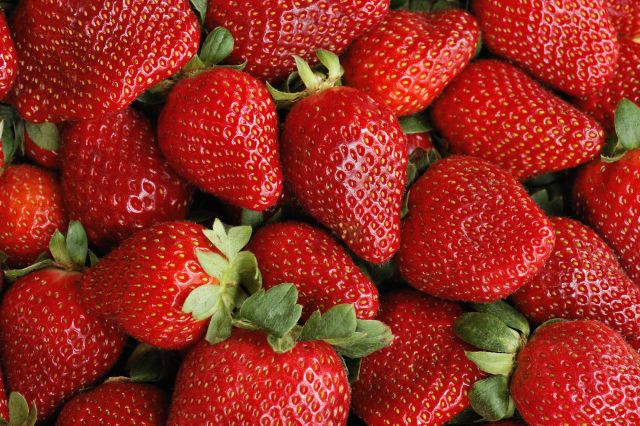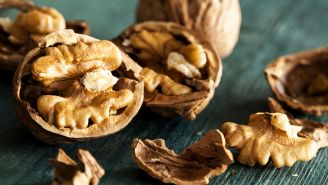Updated on February 3, 2023.
The next time you get a hankering for something sweet, bypass the cookies or cake and grab a handful of strawberries. Your heart will thank you for it.
A growing body of research suggests that berries—because of their antioxidants and other beneficial plant chemicals—may improve levels of cholesterol and other fats in the blood. Strawberries are particularly rich in these phytonutrients, making them a good choice for anyone seeking to lower their risk of cardiovascular disease.
Berry powerful
Heart disease is the leading cause of mortality for adults in the United States, accounting for about one in every five deaths. Some risks for heart disease are unavoidable, like a family history of the condition or advanced age. But one of the major risk factors for developing heart disease—having high cholesterol—can be managed in large part through regular exercise and eating a healthy, balanced diet. Part of that optimal diet may be a handful of strawberries each day.
In a 2022 study published in the Journal of the American Nutrition Association, overweight or obese adults with high cholesterol were given low doses (13 grams) or high doses (40 grams) of strawberry powder in a drink daily. Researchers found that eating the lower amount (the equivalent of about one serving of seven whole strawberries each day) was effective at reducing total cholesterol levels by 2.8 percent, compared to a control group. Interestingly, the lower dose was also more effective at reducing levels of low-density lipoprotein (LDL, or “bad” cholesterol) than a higher dose of strawberries (roughly three servings per day).
In another article published in 2021 in the journal Nutrients, researchers gave middle-aged, obese people with high cholesterol 32 grams of strawberry powder daily (equivalent to about two-and-a-half servings of berries). After four weeks, the strawberry supplement was shown to lower LDL and to reduce the amount of very-low-density lipoprotein (VLDL), circulating in the blood. VLDL is a bad cholesterol that carries triglycerides, another form of harmful fat, in the bloodstream to your tissues. Higher levels of both LDL and VLDL have been associated with cardiovascular disease and atherosclerosis, or hardening and narrowing of the arteries.
If you can’t get enough of strawberries, other research suggests that even larger helpings may also be beneficial. Italian and Spanish researchers provided healthy people with about one pound of strawberries daily for a month. After 30 days, the strawberry eaters had reduced levels of total cholesterol, LDL, and triglycerides by nearly 9 percent, 14 percent, and 21 percent, respectively. The study was published in 2014 in The Journal of Nutritional Biochemistry.
Most researchers point to the antioxidants in strawberries—in particular anthocyanins, proanthocyanidins, and ellagitannins—as the heart-healthy components. These plant compounds, also known as polyphenols, are thought to improve the function of blood vessels and to protect the body from oxidative stress. This form of damage occurs when there are more harmful free radicals in the body than there are protective antioxidants to neutralize them. An overload of free radicals can result in inflammation and damage to cells and DNA.
The right time for strawberries
In the previous studies, participants were asked to drink their strawberry beverage between meals, without changing their overall diet. But one study found that timing strawberry intake right after a high-fat meal may be particularly beneficial.
The study involved 24 middle-aged people with high cholesterol. Participants were given beverages containing the equivalent of 10 grams of dried strawberries or a placebo after eating high-fat meals over a six-week period. Strawberry intake seemed to minimize oxidized LDL—a dangerous, unstable kind of cholesterol that can harm the lining of arteries. An artery wall injured by oxidized LDL creates a foothold for plaque to accumulate. Regular exercise and an overall healthful diet filled with fresh berries are two good ways to help prevent that from happening.
It's important to note that the high-fat meal offered to participants included a bagel, cream cheese, whole milk, and eggs. Strawberries alone aren’t going to make up for a diet otherwise laden with saturated fat. But in addition to making tweaks to your usual meal—like swapping in a whole-grain bagel and trying low-fat cream cheese and skim milk—adding a few strawberries may help. The equivalent of just two-thirds of a cup reduced oxidized LDL spikes by 116 percent in the study.
Satisfy your sweet tooth naturally
Cholesterol and triglyceride levels tend to spike after meals rich in saturated fat, but it also occurs with heavy intake of added sugar. That means sweetening your foods naturally with strawberries may give you a double boost of cholesterol-fighting action.
Strawberries are great eaten plain, but if you want to mix things up, you can include them on oatmeal (another cholesterol-lowering food), served with a splash of balsamic vinegar or a light shake of pepper (instead of sugar) for dessert, or as a topping for low-fat yogurt.
Peak strawberry season tends to run from spring to summer in most of the United States. If you don’t see fresh strawberries in the produce aisle, many grocery stores carry them in the freezer section. Frozen strawberries pack a comparable nutritional boost to the fresh variety, make great smoothies, and are also versatile when thawed.
Not a fan of strawberries or have an allergy? Other foods that are rich in the same polyphenols include blueberries, grapes, red cabbage, and cranberries.







